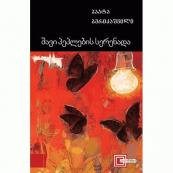The main hero of the story is Ashot Baloiani, a person of undetermined origin, nationality and profession. His given name and surname are false. He is an invalid, and it is some time since he stopped being a criminal, but people are still afraid of him and respect him. Baloiani is always in a state of expectation, he invents his past, he gives his neighbours advice and tells them what to do: they are people from the ‘lower depths; and constantly find themselves in a ridiculous state. Baloiani is always protected by someone and responds likewise. He thinks that he is the only survivor from the ‘old world’. The little ‘Italian house and yard’, where, as he says, there are now ‘up to fifty idiots living’, used to belong, in past Soviet times, to someone who had been repressed. Now the offspring — Mrs Sophie — of this man is living in this house on the third floor . Like Baloiani, she is elderly; she is a likeable woman. She almost never goes out, and does not mingle with the neighbours. The only thing that reminds her neighbours of her existence is the sound of her upright piano. Sophie’s life seems to have been held up by her expectation of something: then suddenly, Baloiani’s old friend and sympathiser, Tatash Dadeshkeliani, comes home: 40-45 years ago Ashot and Sophie had both mourned him, because they had seen news that he had been sentenced to death. Nevertheless, they always had suspicions that something was not quite as it appeared from official documents. Tatash is very old, he is ill and enfeebled, and cannot walk unaided: members of a group of carers take him about in a wheelchair. Dadeshkeliani has left educated families and is from a criminal ‘sect’. He has a university degree and speaks several languages. He tells of his adventures: life has taken him to many countries, and he ended up in France, he has also published books. But he has still realised that his life was a failure and was wrong. It failed because his motivation was lost, the essential stimulus for a human being to live by. He calls Ashot by his real name, Iotam, and explains that it is stupid to seek adventures only for the sake of adventures, that all that passes very soon and is tedious. ‘Somebody has to love you for you to grow old!’ he tells his old crony. But to get someone to love you means that you have to have done something good, at least to one other person. ‘But we live like black butterflies, Iotam! everyone is afraid of black butterflies, they are so big, that they look like bats. But a butterfly, after all, is just a butterfly, Iotam! It dies in three days, it withers up, a bird will come and gulp it down… The main thing is those hopeless losers — I’m talking about butterflies ‘ don’t even get time to lay their eggs…’ Before he dies, Dadeshkeliani comes back to his only love, Sophie, and very soon, within a week, dies. Before he dies, he gives his revolver and books to Baloiani. An enormous number of old ‘pals’ turn up to Dadeshkeliani’s funeral from all parts of the country. Baloiani is amazed: this was someone so decrepit, responsible for a thousand misfortunes and at the same time a persistent criminal. Nobody thought such people were still alive. They weren’t just alive, they produced grandchildren and great-grandchildren. Baloiani, sitting in a wheelchair at the requiem service, can see only black butterflies. After the funeral, at a table set up in the yard, Sophie and Baloiani meet. He has been drinking. He has a guitar brought and Sophie starts to play. Baloiani puts one bullet in the revolver in his pocket and has already decided to kill himself…
Paata Berikashvili is a familiar name in today’s Georgian literature. His verse and prose texts are distinguished by their stylistic peculiarities — an apparent academic rigour is imbued with an inner avant-garde tendency. Acute psychological and social, themes come to the fore. Verbal precision and syntactic harmony acquire particular importance. The collection of short stories A Serenade of Black Butterflies is one of his interesting books. It is a panorama of Tbilisi in the 1990s and later: extreme poverty, a degraded society, a grey, ashen existence, a lost generation’s struggle for survival. Grotesque figures in a grotesque reality. It is a cruel negative, but one thing stands out: these people can still laugh, both at their own selves and at the rest of the world. Laughter in fact is this ‘lost generation’s’ only chance of survival
Ivane Amirkhanashvili, literary critic
In case of using the information, please, indicate the source.
